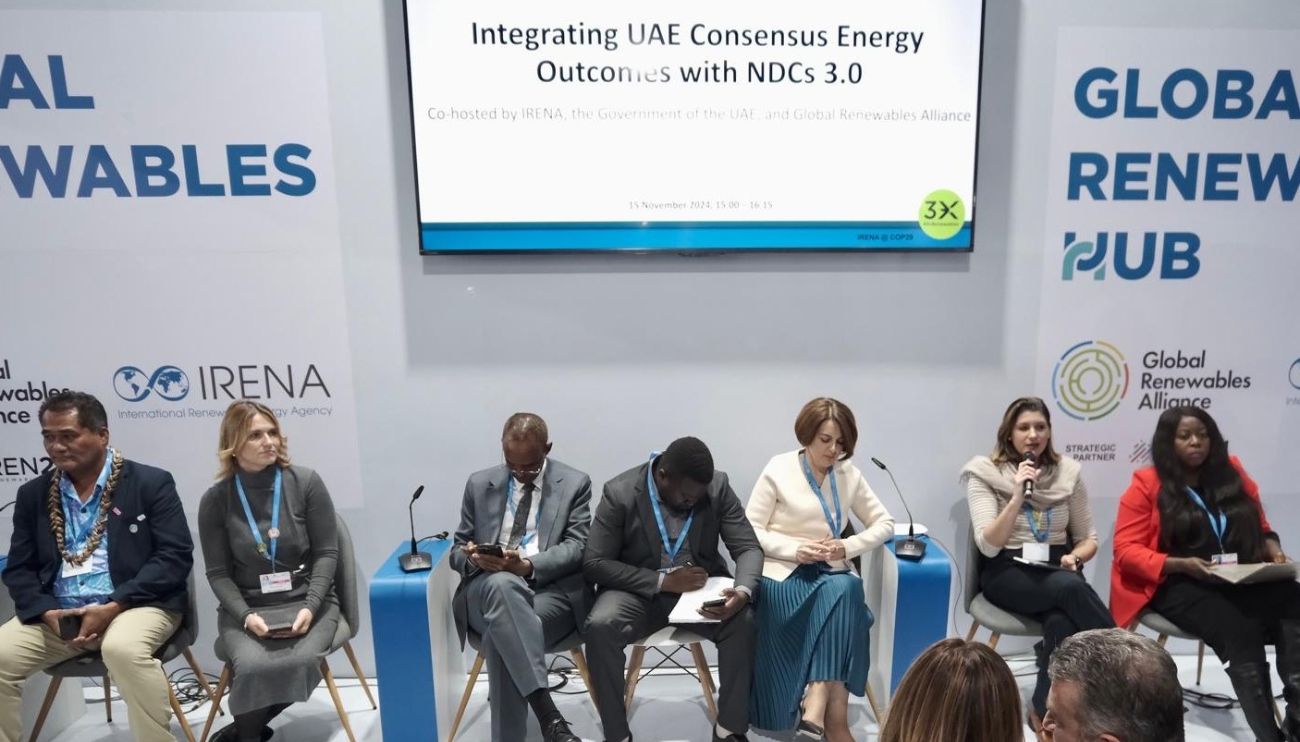Scaling up renewables and improving energy efficiency are the most logical and least costly actions that can be taken by 2030 if the world is to achieve net zero by 2050. Rooted in IRENA’s World Energy Transitions Outlook, this is one of the key energy outcomes of the UAE Consensus as agreed at COP28 in Dubai, a landmark agreement to transition away from fossil fuels and keep the climate target of 1.5 °C within reach.
With the third round of national climate plans (NDCs) submissions due in early 2025 before COP30 in Belem, Brazil, countries are expected to define higher levels of mitigation ambition along the UAE Consensus. NDCs 3.0 must particularly reflect the global goal of tripling renewable power capacity by 2030.
At COP29 in Baku, IRENA, the United Arab Emirates and the Global Renewables Alliance (GRA) co-hosted a side-event at the Global Renewables Hub to discuss challenges and opportunities of “Integrating UAE Consensus Energy Outcomes with NDCs 3.0”.
🎯Despite a record 473 GW of #renewable capacity added in 2023, an annual growth rate of 16.4% is needed to meet the #UAEConsensus.
⭕️Govt. of UAE, @IRENA & @GRA_Renewables jointly hosted a side event at #COP29 today to outline challenges & opportunities for ensuring the… pic.twitter.com/PKloNC7dzQ
— IRENA (@IRENA) November 15, 2024
“It is not just about ambition”, said IRENA Director-General Francesco La Camera, “It’s about translating the ambition into action. Aligning our progress with a 1.5°C trajectory requires coordinated global action to overcome the structural and systemic barriers that hinder our advancement.”
The event was opened by H.E. Dr Nawal Al-Hosany, the Permanent Representative of UAE to IRENA and followed by key notes by H.E. Mr Toeolesulusulu Cedric Pose Salesa Schuster, Samoa’s Minister of Natural Resources and Environment, Ms Mariana Especie, Special Adviser to the Energy Minister of Brazil (incoming COP30), Mr Ali Mohammed, Chair of the Africa Group of Negotiators and Special Envoy on Climate Change in the Office of Kenya’s President as well as H.E. Dr Nkiruka Chidia Maduekwe, Special Presidential Envoy on Climate Action and Director-General of the National Council on Climate Change in Nigeria, amongst others.
Although countries have been pledging ambitious climate targets through their updated NDCs, the pathways outlined in these NDCs are insufficient to reach the Paris Agreement goals. To support this process, IRENA has engaged with 101 countries that are Parties to the 2015 Paris Agreement.
The 2030 targets of #3xRenewables & #2xEnergyEfficiency are crucial milestones for keeping 1.5 °C alive.🌐
Launched at #COP29, new report examines national & regional efforts to enhance & implement #climate targets, & the related assistance provided by @IRENA through its work… pic.twitter.com/TicmisXnfu
— IRENA (@IRENA) November 15, 2024
Through this country engagement, IRENA assists in the enhancement and implementation of NDCs with a focus on the energy sector, according to the Agency’s new ‘Climate Action Support 2024’ report that was presented during the event.
The engagement with its member countries covers a total population of around 5.9 billion people and combined greenhouse gas emissions totaling an estimated 31 818 million tonnes of CO2 equivalent in 2023.
Source link
www.irena.org


